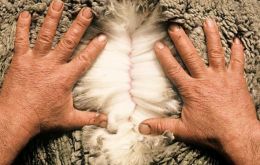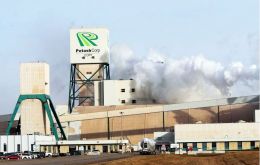MercoPress. South Atlantic News Agency
Agriculture
-
Friday, October 14th 2016 - 11:47 UTC
Symbolic trial will try to hold Monsanto accountable for “ecocide”

This weekend 30 witnesses and legal experts from five different continents will testify before five international judges at the three-day Monsanto Tribunal in The Hague, Netherlands. Their testimonies will attempt to hold the agrochemical giant accountable for their alleged “crimes against humanity” and destruction of the environment, or “ecocide”
-
Friday, October 14th 2016 - 09:37 UTC
Falkland Island farmers tour Australia for improved sheep genetics

Three Falkland Islands farmers and the general manager of Falklands Landholdings Corporation recently travelled to Australia as part of the ongoing search for improvements to lamb survival rates in the Falklands. Touring farms in both Queensland and New South Wales, the group spent three weeks inspecting Australian studs in search of better fat and muscle values in young rams.
-
Monday, October 10th 2016 - 11:38 UTC
Record global productions of wheat, rice and corn will keep prices low

Global food markets will likely remain “generally well balanced” in the year ahead, as prices for most internationally-traded agricultural commodities are relatively low and stable, FAO said. The benign outlook, especially for staple grains, is poised to lower the world food import bill to a six-year low, according to the Food Outlook.
-
Saturday, October 8th 2016 - 09:59 UTC
WTO confirms ruling in favor of Argentina in biodiesel imports dispute with EU

The World Trade Organization confirmed on appeal on Thursday its ruling partially in favor of Argentina in its dispute with the European Union over duties the bloc imposes on imported biodiesel.
-
Wednesday, September 28th 2016 - 08:10 UTC
Argentina lost 12% of national flock to severe drought in north Patagonia

North Patagonia in Argentina is suffering the worst drought is 17 years which has meant the loss of 1.8 million sheep, since 2007, and so far this year rainfall has been 45% below the historic average.
-
Saturday, September 24th 2016 - 20:04 UTC
August FAO Food Price Index at its highest since May 2015; all commodities up except for cereals

The FAO Food Price Index (FFPI) averaged 165.6 points in August 2016, up 3 points (1.9%) from July and almost 7% above the corresponding period last year. The August value of the Index is the highest since May 2015. Except for cereals, prices of all other commodities used in the calculation of the FFPI rose in August, led by dairy, oils and sugar.
-
Thursday, September 22nd 2016 - 22:18 UTC
FAO forecasts higher harvest prospects for maize, wheat and rice

Staple food prices rose in August even as grain prices fell and the outlook for global cereal production improved. The FAO Food Price Index averaged 165.6 points in August, up 1.9% from July and almost 7% from a year earlier. The monthly jump was mostly driven by cheese and palm oil quotations, while those for wheat, maize and rice all fell.
-
Thursday, September 15th 2016 - 20:54 UTC
Falklands' Development Corporation partners with horticultural specialists to expand commercial opportunities

The Falkland Islands Development Corporation (FIDC) announced that three UK horticultural specialists will visit the Falklands next month in order to appraise the potential for future horticultural developments. The three consultants will be the Islands for a week and will hope to identify profitable, commercial opportunities for Falkland businesses.
-
Wednesday, September 14th 2016 - 16:49 UTC
Falklands registers for world shearing championships in NZ next February

The World Shearing Championships Committee finds another gear as the World Event quickly approaches. Being held in Invercargill, Southland, New Zealand from the 9th to the 11th February in the ILT Stadium Southland, not only is the committee excited about hosting this event but Southland and New Zealand is getting behind a first in the South Island and only 5th time being held in New Zealand over a 40 year period (1980, 1988, 1996, 2012 – Masterton)
-
Wednesday, September 14th 2016 - 13:18 UTC
Canada's Agrium and Potash create fertilizer and farm retailing giant

Canada's Agrium and Potash Corp. of Saskatchewan said they would combine, a deal that would create a fertilizer and farm retailing giant with pro-forma enterprise value of US$36 billion but also trigger U.S. regulatory scrutiny.